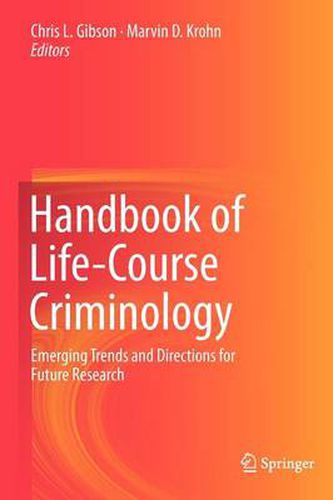Readings Newsletter
Become a Readings Member to make your shopping experience even easier.
Sign in or sign up for free!
You’re not far away from qualifying for FREE standard shipping within Australia
You’ve qualified for FREE standard shipping within Australia
The cart is loading…






This title is printed to order. This book may have been self-published. If so, we cannot guarantee the quality of the content. In the main most books will have gone through the editing process however some may not. We therefore suggest that you be aware of this before ordering this book. If in doubt check either the author or publisher’s details as we are unable to accept any returns unless they are faulty. Please contact us if you have any questions.
The wide-ranging scope of the Handbook of Life-Course Criminology covers genetics and environment, child offenders and late bloomers, the impact of school and peers, lifelong and time-limited criminal careers, and qualitative and quantitative methodologies. This unique Handbook is further set apart by its dual coverage of the leading edge of current research and innovative directions for future work in the field.
Pathways to crime have been a central concept of criminology from its inception. Accordingly, a lifespan approach to the field has replaced earlier biological and sociological perspectives with a more nuanced understanding of offender behavior and a wider lens of study. The contributions to this Handbook break down issues of criminal and antisocial behavior from early childhood to late adulthood, examining developmentally targeted prevention and intervention strategies and reviewing emerging trends in research. Among the topics:
*
Childhood: including physical aggression in childhood, pre- and peri-natal development, and environment.
*
Adolescence: the impact of schooling, unstructured time with peers, gang membership and peer networks.
*
Adulthood: Adult onset crime, unemployment in emerging adulthood, crime and adult outcomes.
*
Prevention and Intervention: community programs, lifetime intervention strategies, re-entry.
This volume will be a valuable piece for researchers in Criminology and Criminal Justice as well as related disciplines such as Sociology, Developmental Psychology, and Social Policy. It will serve as an important reference for the current state of research, as well as a roadmap for future scholars.
This impressive Handbook provides comprehensive coverage of key developmental and life course issues in criminology from birth to adulthood, including biology, genetics, gangs, schools, neighborhoods, adult onset, desistance, and interventions. The research recommendations in each chapter are especially important, and they should stimulate advances in knowledge for many years to come. This Handbook should be required reading for all criminologists.
David P. Farrington, Professor of Psychological Criminology, Cambridge University, Cambridge, UK
In just a few decades developmental criminology has become the dominant intellectual force in criminology. This volume demonstrates why. It provides incisive reviews of important themes in developmental criminology. More importantly, it lays out rich agendas for future research that should inspire the next generation of developmental criminologists.
Daniel S. Nagin, Teresa and H. John Heinz III University Professor of Public Policy and Statistics, Carnegie Melon University, Pittsburgh, PA, USA
$9.00 standard shipping within Australia
FREE standard shipping within Australia for orders over $100.00
Express & International shipping calculated at checkout
This title is printed to order. This book may have been self-published. If so, we cannot guarantee the quality of the content. In the main most books will have gone through the editing process however some may not. We therefore suggest that you be aware of this before ordering this book. If in doubt check either the author or publisher’s details as we are unable to accept any returns unless they are faulty. Please contact us if you have any questions.
The wide-ranging scope of the Handbook of Life-Course Criminology covers genetics and environment, child offenders and late bloomers, the impact of school and peers, lifelong and time-limited criminal careers, and qualitative and quantitative methodologies. This unique Handbook is further set apart by its dual coverage of the leading edge of current research and innovative directions for future work in the field.
Pathways to crime have been a central concept of criminology from its inception. Accordingly, a lifespan approach to the field has replaced earlier biological and sociological perspectives with a more nuanced understanding of offender behavior and a wider lens of study. The contributions to this Handbook break down issues of criminal and antisocial behavior from early childhood to late adulthood, examining developmentally targeted prevention and intervention strategies and reviewing emerging trends in research. Among the topics:
*
Childhood: including physical aggression in childhood, pre- and peri-natal development, and environment.
*
Adolescence: the impact of schooling, unstructured time with peers, gang membership and peer networks.
*
Adulthood: Adult onset crime, unemployment in emerging adulthood, crime and adult outcomes.
*
Prevention and Intervention: community programs, lifetime intervention strategies, re-entry.
This volume will be a valuable piece for researchers in Criminology and Criminal Justice as well as related disciplines such as Sociology, Developmental Psychology, and Social Policy. It will serve as an important reference for the current state of research, as well as a roadmap for future scholars.
This impressive Handbook provides comprehensive coverage of key developmental and life course issues in criminology from birth to adulthood, including biology, genetics, gangs, schools, neighborhoods, adult onset, desistance, and interventions. The research recommendations in each chapter are especially important, and they should stimulate advances in knowledge for many years to come. This Handbook should be required reading for all criminologists.
David P. Farrington, Professor of Psychological Criminology, Cambridge University, Cambridge, UK
In just a few decades developmental criminology has become the dominant intellectual force in criminology. This volume demonstrates why. It provides incisive reviews of important themes in developmental criminology. More importantly, it lays out rich agendas for future research that should inspire the next generation of developmental criminologists.
Daniel S. Nagin, Teresa and H. John Heinz III University Professor of Public Policy and Statistics, Carnegie Melon University, Pittsburgh, PA, USA